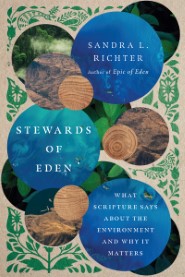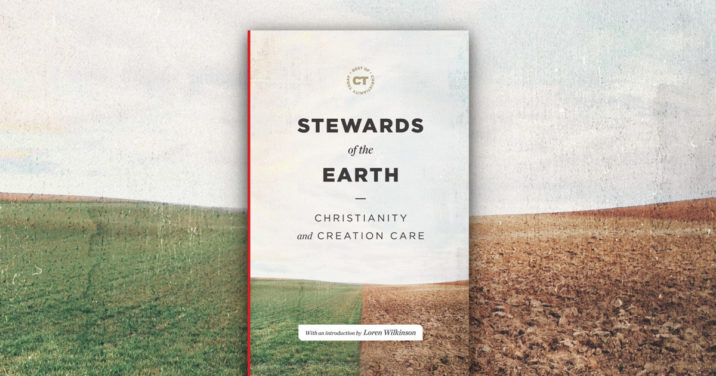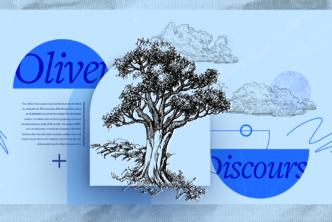Over the past 50 years, the conversation around whether humans have damaged the earth has become more prevalent. The issue has divided many, even within the church. Is there a Christian vision of conserving the environment and how we should steward creation?
The articles, interviews, and editorials compiled in Stewards of the Earth: Christianity and Creation Care (part of the Best of Christianity Today Series) provide an overview of how evangelical Christians in America have responded to that awareness over the past five decades. Reflecting various insightful, inspiring, and obtuse attitudes, Stewards of the Earth displays the diversity and development of evangelical perspectives on creation care.1
In this article excerpted from the book, David Neff explores what it means for Christians to have a strong orientation toward eschatological or “last things” regarding the environment.
***
It’s often said that many Christians—particularly evangelical Christians—don’t care for the environment precisely because they are so focused on end times. If God is going to come and destroy all this anyway, why should we invest our energies in preserving it? . . . How can a people focused steadily on the last days find the theological motivation and will to steward the natural world “with a skill to leave the resources needed for future generations”?
Creation as promise to keep
Theologian John Haught of Georgetown University claims that Christians should not bracket their beliefs about last things when thinking theologically about the environment. There is a fear among theologians who specialize in thinking about the environment that too much talk about the End (for that matter, any talk at all) will undermine care for the Creation. But . . . “It ain’t necessarily so.”
As the great German theologian Jürgen Moltmann wrote in Theology of Hope:
From first to last, and not merely in the epilogue, Christianity is eschatology, is hope, forward looking and forward moving, and therefore also revolutionizing and transforming the present. The eschatological is not one element of Christianity, but it is the medium of Christian faith as such, the key in which everything in it is set, the glow that suffuses everything here in the dawn of an expected new day. . . Hence eschatology cannot really be only a part of Christian doctrine. Rather, the eschatological outlook is characteristic of all Christian proclamation, of every Christian existence and of the whole Church. There is therefore only one real problem in Christian theology . . . the problem of the future.
Or think of a teenager eager to learn to drive, who has just acquired a learner’s permit. The learner’s permit is not a driver’s license. But it is what it is—a bearer of promise. What young man getting his learner’s permit doesn’t beam with joy? While it’s not a driver’s license, no teen disrespects a permit.
Resources about creation care

Stewards of Eden: What Scripture Says about the Environment and Why It Matters
Regular price: $12.99
So an orientation toward that which is to come helps us think in terms of promise and fulfillment. And while promise isn’t fulfillment, it is something precious.
Keeping the end in mind
Framing a discussion of the natural world eschatologically also leads toward other lines of thought we should consider.
Creation has limits.
First, knowing that the creation as we have it is promise and not fulfillment means that we will recognize its limits and conserve it. Nature as we know it is bountiful, but not unbounded. As we have been repeatedly reminded, there are limits to fossil fuels. Even the fuels for nuclear power are seriously limited. These facts should not surprise us. The creation is a limited thing, a provisional thing.
Christians with an eschatological vision do not want to despoil the earth of its resources. Part of being human is learning to live (and consume) within limits. It is liberal Christianity, at least in its classic form with its unbounded optimism about human resourcefulness and technological prowess, that should be readjusting. Christians operating with the end in mind should always have limits in view, but like everyone else in North America, Christians have by and large been co-opted by consumer culture. It is now up to us to live with a theology of limits.
Similarly, seeing creation as promise prevents us from treating it as mere raw material. If the gift of creation were simply a commodity, then we could consume it the way we consume a gift box of chocolates. But because it carries promise, it must be conserved until the time of fulfillment.
Creation is not an ultimate value.
Second, knowing that creation is God’s promise helps us realize that the creation is not an ultimate value. The theologians who don’t pay attention to this fact end up sliding off into one of any number of views that simply get the world wrong: pantheism, nature mysticism, deep ecology, or re-paganization.
While it is important to reject the mechanical materialism of the seventeenth century (the philosophy that paved the way for industrialization), there is no reason to revert to nature idolatry, paganism, shamanism, or animism. We need to be sure that the core ecological insight—of the complex, weblike interrelatedness of all things animate and inanimate—guides us to a more sophisticated scientific outlook, not an anti-technological mysticism.
The technological revolutions that accompanied the rise of capitalism did in fact make life a lot better for many people. They brought health, nutrition, and leisure to the masses for the first time in history. So we are careful to treat nature as a relative good rather than something to be worshiped.
Similarly, seeing nature through eschatological eyes helps us rise above natural cycles. In the ancient world, the pagan view of history was tied to the cycles of fertility and the seasons. The seasonal flooding of the Nile, the early and later rainy seasons in Palestine—these things dominated the pagan view of life. But the Jewish and Christian views were historical. Biblical religion celebrated God’s abundance in the annual agricultural cycles. But the more important festivals celebrated historical events: the liberation from slavery in Egypt and the giving of the Torah. This prepared them to understand God and his actions in the framework of world history. What the superpowers of the day—Egypt, Babylon, Persia, Greece, and Rome—did was of significance to God and God’s people. And for Christians, what happened at the Cross became the center point of history.
Eschatology is one form of biblical historical consciousness. It helps us see the cosmos in the context of time and history. Such a historical view is a religious perspective that empowers people to take significant action and not be bound to insignificance by the cycles of time.
There’s a bigger salvific picture.
Third, an eschatological frame helps us take account of the big picture of salvation. Evangelical forms of Christianity—most notably its pietist and revivalist strands—have tended to focus on the personal experience of present salvation. And there are good historical reasons for that. Think of Luther’s struggle for a sense of acceptance with a wrathful God. Or think of John Wesley’s famous experience of having his heart strangely warmed when he heard the preface to Luther’s Commentary on the Epistle to the Romans read at Aldersgate Chapel: “An assurance was given me that he had taken away my sins, even mine, and saved me from the law of sin and death.”
But as the apostle Paul contemplates the end of all things in his epistle to the church in Rome, he talks not just about individuals awaiting their redemption but about the whole creation as well:
The creation was subjected to frustration, not by its own choice, but by the will of the one who subjected it, in hope that the creation itself will be liberated from its bondage to decay and brought into the glorious freedom of the children of God. We know that the whole creation has been groaning as in the pains of childbirth right up to the present time. Not only so, but we ourselves, who have the firstfruits of the Spirit, groan inwardly as we wait eagerly for our adoption as sons, the redemption of our bodies. For in this hope we were saved. (Rom 8:20–24)
Christ didn’t come to save just you or just me—though his ultimate sacrifice assures us of our individual worth. He came to save Adam’s fallen race by becoming the Second Adam, the head of a new humanity that will someday inhabit a new and improved version of the Eden that Adam and Eve were forced to leave. When we remember that a restored humanity in a restored Eden is the crowning vision of Scripture, we come to see ourselves and our responsibilities in a bigger, broader landscape.
That broader landscape will encourage us to engage with the “groanings” of creation as we are now able to hear them.
Creation care is for God’s sake . . . not ours.
Fourth, an eschatological perspective helps us save nature for God’s sake, not just for our own benefit. Care for the natural world is not just about a cost-benefit analysis for human welfare, though that must always be done. But if God has a plan for this natural world, has a bright future for it, we do not always need to see the benefit for ourselves before acting to preserve the natural order. It should be enough for us that this is part of God’s vision for the future and a carrier of his promises.
An end times view broadens our vision.
Fifth, and finally, an eschatological perspective can help us deepen our relationship to all people and all things. As Christians, we are called to love our neighbors as ourselves, and Jesus defined “neighbor” in extremely broad terms. I find it difficult to love and serve as broadly as Jesus calls me to. In the global community that communication technology and multinational businesses have brought about, I can know about, and feel concern about, needs that I can never hope to address. Geographical and cultural distance can be a real source of frustration when I hear that genocide is going on in one place or starvation in another. Aside from emailing my congressional representative and donating a few dollars to disaster response and relief work, it is hard to know how to relate.
There are limitations on my present existence that will no longer exist in the kingdom of God. Yet for now, despite limits of money, time, and energy, as well as cultural, ethnic, and linguistic barriers, relate I must.
The eschatological vision portrays a global community that is no longer divided by tribal and ethnic barriers. Both the Hebrew prophets and the Book of Revelation portray a new humanity drawn from every tribe and nation, language group and people. That vision causes me to care just as much about what rising sea levels do to impoverished people in Bangladesh as about what they do to affluent people living on the isle of Manhattan. That vision causes me to care just as much about what happens when sea erosion causes buildings to collapse on the Alaskan island of Shishmaref as it does when rich people’s houses in Malibu slide into the ocean.
Seeing through eschatological eyes pushes me in the direction of relating to desperate people who are at a distance because God has promised some day to bring them close.
A sign of his promise
When I was growing up, eschatology meant “end times”—that is, my church focused on the timing and manner of final events.
But Jesus and the apostles played down the time element and even the manner of the end. Instead, they emphasized the inbreaking of God’s rule and the way our ability to see his rule helps to transform the present.
If we are given that ability to see God at work, bringing the present into contact with the end, we cannot be indifferent to the way things are. We cannot be deaf to the groanings of creation. And we can treasure every gift God gives us as a sign of his promises.2
***
This excerpt about Christians and the environment is adapted from Stewards of the Earth: Christianity and Creation Care, available now from Lexham Press.
Related articles
- Sea Monsters in the Bible: Did God Fight a Literal Serpent at Creation?
- Who Are Gog and Magog in the Bible & What’s So Evil about the North?
- 4 Views on the End Times—and What They Have in Common
- End Times Prophecy and Why There Is So Much Disagreement
- Loren Wilkinson, “Introduction: Fifty Years of American Evangelical Thinking about the Gospel and Creation,” in Stewards of the Earth: Christianity and Creation Care, Best of Christianity Today (Bellingham, WA: Lexham Press, 2022), ix.
- Stewards of the Earth: Christianity and Creation Care, Best of Christianity Today (Bellingham, WA: Lexham Press, 2022), 204.







